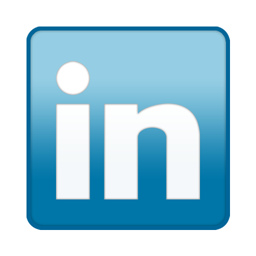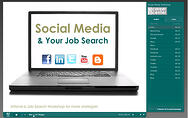 I was prompted to write this post in response to a comment on an earlier blog post found both here and at CareerHubBlog:
I was prompted to write this post in response to a comment on an earlier blog post found both here and at CareerHubBlog:
7 Key Ways to Use Social Media in Your Job Search
Rory says:
![]() 888-737-3963
888-737-3963
Posted by Tyrone Norwood
Mar 16, 2013 7:59:00 AM
 I was prompted to write this post in response to a comment on an earlier blog post found both here and at CareerHubBlog:
I was prompted to write this post in response to a comment on an earlier blog post found both here and at CareerHubBlog:
7 Key Ways to Use Social Media in Your Job Search
Rory says:
Topics: job search, networking, recruiters, LinkedIn for job search

I just had to write a quick post to let you all know about an intriguing trick interview question and the trick to answering it!
I was talking to an IT Director who said that he was asked this question when he was applying, earlier in his career, for a position managing a Help Desk. He was offered the job on the basis of his answer. The hiring authority told him other candidates failed to answer this question in a way that would convince him that they had an innate sense of customer service - that is, a natural tendency to deliver top-notch answers, support, and solutions.
How did my client answer?
"What kind?"
A brilliant answer that showed that his first instinct was to determine the needs of the customer. Other people may have answered: "Yes, I know how to bake a cake," or "If I have a recipe," or "Only if I have the ingredients," or "I'm not that good at baking cakes."
Companies use so-called "trick" questions to uncover qualities in a candidate that straightforward interview questions cannot. Candidates are pretty savvy as to what the interviewer is looking for when asking a question. Questions like the one my client was asked is less easy to "game."
So, how can you be prepared to answer a question that seems to come out of left field? Take a minute to think before you answer. It's OK to do that, even to ask, "Please give me a minute." Consider what core skills are required by the job. How does the question relate? Is it analogous to what you would be doing on the job? What answer could you give that would translate over to the job in question?
This tip may help - or not. Giving the right answer also may not indicate who is best for the job. I can imagine a person who gives the right answer to a trick question might be someone who has a particularly "creative divergent" thinking style, rather than someone with the core skill supposedly being tested.
But if you take a minute, you may be able to "psyche out" the real question behind the question!
PS I can bake a chocolate cake. But only with a recipe and the right ingredients. I'm not so good at white cakes. Why would you want a cake? What's that have to do with anything. I love cake! JC
Topics: job search, interview questions, trick interview questions
 One of the biggest concerns my executive clients have is how to use social media in their job search. They know that it's the new kid on the job search block, but they themselves have rarely gone beyond a bare bones LinkedIn profile (LIP). Facebook evokes shudders of horror, and Twitter is deemed trivial.
One of the biggest concerns my executive clients have is how to use social media in their job search. They know that it's the new kid on the job search block, but they themselves have rarely gone beyond a bare bones LinkedIn profile (LIP). Facebook evokes shudders of horror, and Twitter is deemed trivial.
Some rethinking might be in order. Life calls on us to go out of our comfort zone on occasion - and this may be one of those times. See what you think about these steps to start actively leveraging the good in social media to promote your personal brand for job search and career advancement. Do they feel doable to you?
1. When you see a job you're interested in anywhere, use LI to connect with a couple of managers in the company that posted the job. Ask for 5-10 minutes of their time - say that you are interested in the job and want to find out a little bit about company culture, trends, etc. If it feels comfortable, request that they forward your resume to the hiring manager (not HR - submit that separately as instructed in the job ad). Why would they help you? Employees frequently get financially rewarded for referring a candidate that gets hired.
2. "Rinse and repeat" for your other social media sites: Identify employees, ask for a brief conversation, ask that they forward your resume to the hiring manager.
3. Reach out directly through LinkedIn to the recruiter or hiring manager. Express interest. Send your resume.
4. On Facebook, go to the company pages set up by your target companies and "Like" the company (recruiters say they notice "likes" more than comments!).
5. Expand your online footprint, so that when your name is Googled (and it will be!), you show up, on brand, in a number of places, not just LinkedIn.
6. Search for jobs on LI, Twitter, and Facebook every day or every other day. They (and job apps created around them) all have extensive job listings. To find third-party apps, Google like this: "[Twitter] job search."
7. Watch the activity of companies you are targeting. If you see they are going through M&A (mergers and acquisitions), opening up new offices, expanding product lines, etc., use that information to position yourself as a "solution" in a letter direct to the hiring manager (US Mail) or via email.
This is a limited list, but if you implement some or most of these items, you will be in a good position to both attract recruiter interest and get interviews. Practice until you become adept at leveraging the personal promotional potential of social media sites. Take the advice of my client who "poo-pood" these suggestions at first and now uses Twitter almost exclusively for Healthcare IT professional information. Do it and see. You'll be glad you did.
Tags: LinkedIn, Twitter, networking, social media job search, Pinterest, youtube
Topics: LinkedIn, networking, personal branding, personal brand, Twitter, Social media job search, Pinterest, youtube
Posted by Tyrone Norwood
Feb 17, 2013 10:43:00 AM

Usually we think of "passive" being a negative descriptor, right? Well, in terms of job search and career management in general, being passive in social media is good! Being active is good too! It's a case, not of either/or, but of both/and. Today we're going to talk about the passive job search via social media. Once you implement the tips below, you can be attracting recruiter interest 24/7.
With the acceleration of social media use by recruiters and hiring authorities, no professional in transition should delay in taking advantage of these new job search channels. Here are some tips:
Passive Social Media Job Search - Make sure that when recruiters are searching for candidates on social media sites, they can find you. These are active things you can do so that you can passively job search.
This is a limited list, but if you implement some or most of these items, you will be in a good position to both attract recruiter interest and get interviews. Take the advice of my client: even if you "poo-poo" these suggestions, do them anyway! You'll be glad you did.
In our next blog post, we'll have 7 tips for actively job searching via social media. Stay tuned!
Topics: LinkedIn, networking, Twitter, Social media job search, Pinterest, youtube
Posted by Tyrone Norwood
Jan 29, 2013 10:16:00 AM

The CareerXroads Source of Hire Survey for 2012 surveyed mid- to large-sized companies hiring for $150k-$300k jobs. 36 competitive firms responded with 2,139 total jobs filled. The results suggest some interesting directions for executives in job search mode to go. Here is some of the data, followed by implications for your job search and other job search best practices.
Stay tuned for the 2013 survey which we will bring you up to date on when it comes in - and good luck!
Topics: job search, source of hire survey, how people get jobs
Posted by Tyrone Norwood
Jan 7, 2013 7:50:00 AM

Conferences can be goldmines for executives involved in a confidental job search. Here are 10 tips:
1. Do NOT ask about positions or do anything else close to looking for a job. Being paid to rep your company, you have to strictly observe your charge, loyalty to your company.
2. DO collect relationships lavishly - business cards from everyone - but, also, make an attempt to make a real connection so that you are memorable - use your brand "The strategic cloud computing expert with a business focus." Any non-work connections/interests will help you be memorable as well.
3. Offer to help new contacts in any way that you can - including connecting them with people you know to help them with their job transitions, if they ask about that.
4. When you get home, invite all the people on your business cards to connect on LinkedIn - also follow them on Twitter.
5. Email the ones you feel you can trust with knowing about your confidential search and ask for a couple of names of people to contact at companies for which you may want to work. Be specific about position - Senior Director of IT - and size of company and industry, so that your contacts can be most helpful to you. Offer to do the same for them, either now or at any time in the future.
6. Select a trusted group of LI connections whom you want to keep updated on your job search. Send an update from LI each week or two telling them about any interesting new meetings or developments in your job search - to keep you "top of mind."
7. For all your connections, including your new conference ones, do regular LI updates - weekly or biweekly - about any (non-job search) activity at your company, your professional pursuits, etc. - again, to keep you top of mind.
8. Join LI groups where key connections belong. That includes recruiters who place IT executives!!!
9. Leverage the new contacts you've made at the conference and send out regular newsletters or links to your blog posts to them. If you don't have either now, consider either or both. They are fantastic networking vehicles.
10. Keep your new contacts alive through occasional personal emails or quick phone calls.
Networking is still the best way to get a job. Make it part of your professional life no matter whether you are in job transition or not. Contacts from conferences - because you can meet so many face-to-face - can be especially valuable, if you use the techniques above. Good luck!
Image attribution: FHSMUN 34
Topics: job search, LinkedIn, networking, conference networking
Posted by Tyrone Norwood
Dec 17, 2012 4:14:00 PM

A recent survey asks recruiters what is the #1 way to get on a company's radar on Facebook? 86% say to "like" them on their company page.
If you've never checked out the company pages on Facebook, now's the time. Some companies have a robust, built-out presence - others have almost nothing. But if companies you are targeting are active on Facebook at all, you have a golden opportunity to interact with them there. You can comment on the company's news, keep tabs on what they are doing, and "like" even specific comments.
It sounds as though recruiters are monitoring the activity - and it would benefit the job seeker who is part of it.
Topics: networking, recruiters, faceboook, company pages
Posted by Tyrone Norwood
Nov 27, 2012 8:48:00 AM

As job search coaches, my colleagues and I are experts at helping clients plan and implement their job searches. We teach about social search (leveraging social media), Web 2.0 networking, the Direct Approach, uses of job boards, how to work with recruiters, email and direct mail campaigns etc.
The only trouble is ... sometimes the very nature of job search can cause people to feel uncertain, not in control, anxious, vulnerable, over-eager, even desperate. And these feelings tend to undermine both the activities of job search and interviewing.
To complicate matters, clients frequently are dealing with feelings related to short- or long-term unemployment or sudden termination due to company changes beyond their control (mergers, acquisitions, natural disasters like Sandy, a shift in the company's strategic priorities) or complications such as personnel conflicts or perceived non-performance.
The inevitable emotions that accompany any of these circumstances need to be acknowledged, validated and processed so that they don't creep into your voice, body language or job search effort. Talk to a friend, or get short-term counseling if you need to.
Even if you have a solid position of employment and are just looking around, you will most likely experience a degree of tension about being assessed or judged by hiring authorities or recruiters as they consider you for opportunities.
So, stress, anxiety, self-doubt are often unwelcome guests at the job search party.
This is where some radical healing is needed. This is where some simple Buddhist practices can change your stress into calmness, your anxiety into serenity, your self-doubt into confidence. Practicing the following breathing exercises as presented by Buddhist Thich Nhat Hanh can transform the way you go about your job search.
Try saying these to yourself, breathing deeply in and out, a couple of times a day as you go about your job search. Picture yourself in your mind's eye as a flower, mountain, still waters, space and as a living being and internalize the helpful feelings that accompany those pictures.
Breathing in I see myself as a flower, breathing out I feel fresh
Breathing in I see myself as a mountain, breathing out I feel solid
Breathing in I see myself as still waters, breathing out I feel calm
Breathing in I see myself as space, breathing out I feel free
Breathing in I am alive, breathing out I smile to myself
Thich says, "The best way to take care of the future is to take care of the present - that is the only thing you can do."
Try these practices and see if your job search doesn't start to feel more purposeful and skillful. You may find that you feel more serene as you go about your job search activities, secure in your own unique value in the world and focused on the things you can do in the present, knowing that they will lead to a future that will be a good one for you.
Image attribution: fastcodesign
Topics: job search, Buddhism, Zen

Why the resume as ad? To borrow a phrase from the campaign, do the math!
So, do you think the thoughtful summary, job descriptions, and accomplishments on your resume are going to get read and that the material will prompt the recruiter to choose yours out of hundreds to be one of the 10 marked for follow up??
Heres what I think, having been in the resume writing industry for 19 years now. Todays resume which has only 30 seconds to be reviewed by a recruiter has to act like an ad. Look at an ad. What are some of the elements that make it work?
It is possible, and even desirable, for resume writers to amp up their resumes with some of these elements. One way a resume should be different from an ad, though, is that white space, although necessary, shouldn't own so much real estate that there is no room for descriptions of primary accomplishments for each position.
(Please note: only a stripped down .txt version of your resume should be submitted where there is a chance that it will be processed by an Applicant Tracking System. Use your highly formatted resume for human eyes!)
With those points noted, lets take an ad's elements one at a time and consider how you would build some of its successful features into your resume:
Click here to see examples of resumes that are a fast read with easy-to-grasp "reasons to hire." These are not extreme examples of the resume-as-ad and don't include every element of an ad, but they have enough to have attracted the interest of recruiters.
So don't hesitate to tap into the power of Madison Avenue to help your resume become one of the 10 selected by a recruiter for follow-up!
* Image attribution: Dell
** Statistics courtesy of HR Tech Blog
Topics: career marketing, resume, resumes, resume format, color on resumes

If you look at resume from the nineties or earlier you will commonly see objective statements starting off resumes. They would read something like this:
Objective: A sales job where I can contribute to a company's growth while continuing to advance my career.
Do you want to write this kind of objective statement on your resume these days? NO! This kind of objective statement is an indication that you have not kept up with the times. Even more importantly, recruiters - internal and external - don't care in the least about the benefits you will receive - only the benefits their organization will receive.
Why write this blog post at all, since most people know not to write the old-fashioned kind of objective statement? Because there are reasons why including an objective on your resume is absolutely critical!
1. If you don't say right at the top what position you are seeking - the exact title - the recruiter may not spend the time to figure out which of the several titles you've held - or some other - you are going after! You have only about 120 seconds to provide the recruiter with a "fast match" between your resume and the open job. Make it as easy as possible!
2. If you don't include the position title you are going after - even if you haven't held that one exactly - software used to process resumes will likely not retrieve your resume in a keyword search by a recruiter. And all your time and effort on your resume will be wasted! With 70% of large companies using Applicant Tracking Systems, you can't afford to leave out a critical title keyword!
Here are a couple of examples of ways to use objectives in contemporary resumes. Give your resume a heading, often a title. That's easy if you are a VP of IT and those are the only jobs you are applying for. But what if you've been an VP of IT and you want to apply to a CIO job? You'll want to be sure that title and keyword are prominently featured in your resume. Here's an example:
Targeting: VP of IT / VP of Information Technology | CIO / Chief Information Officer
Under that title, put your branding statement, industry, areas of specialty, or key selling points, whichever is the most strategic. But by including the word "targeting" and the exact position title you are applying for you will allow the reader to immediately categorize you as someone at the right level. Including both the title you currently hold and the title you aspire to also provides you with the critical keywords for electronic processing of your resume.
To make it even more complex, if you are sending your resume to a networking contact and tell him or her that you are looking for the top IT management position in a company, you have to do something more. Since the top tech person in the company goes by different titles depending on a number of factors - such as the size and history of the company - you'll need to cover the waterfront:
Targeting: VP of IT / VP of Information Technology | CIO / Chief Information Officer | Senior Director of IT / Senior Director of Information Technology
That way you enable a "fast match" when a hiring authority or recruiter considers your resume for a particular job and job title. You also have provided the necessary keywords to keep your title options open. Notice that I spelled out "IT" so that either "VP of IT" or "VP of Information Technology" will capture search engine attention.
We've devoted a lot of time in this post to a small number of words on your resume, but they are critical ones. So think like a time-challenged recruiter and like a computer to increase your chances of being considered for a job!
Image Credit: clouducation.wordpress.com/
Topics: resume, resumes, resume writing, sample objectives, resume objectives, resume objective
What's new in high tech resumes, executive resumes, cover letters, job search, and personal branding for executives in technology.
"Thanks for sharing this, Jean. You make some good points - particularly as it concerns the value of a site like LinkedIn in the application process.
In all my years recruiting I've only had one candidate reach out to me on the site (and not even for a position I was sourcing), but I was so impressed that I went out of my way to get the recruiter actually handing the job to give the candidate a phone screen."
Amazingly, some of the simplest tactics can pack the biggest punch when it comes to job search. Going into your target company's Facebook page and clicking "Like" is one. Rory, the recruiter I quote above, confirms that reaching out through LinkedIn can work well.
Here's how to do it:
Find a way to connect with the recruiter working for the company (or, in Rory's case, any recruiter in the group). You can do this by reaching out through your first or second degree connections or using one of your Inmails (~$10/connect). Or, if you aren't connected, join a group that the recruiter is in (see Groups lower down in their profile). That will enable you to connect with another member of the group.
What do you say when you connect? That you saw the job posting and wanted to reach out directly. State your value proposition for that position and add a comment about something unique to that company - a challenge they are experiencing you can help with, for instance, an acquisition, new product line, expansion, new contract etc. Tie that challenge to your experience. Ask if they would be free to talk for 5 or 10 minutes about how your specific experience could help the company with the current challenge. Thank them and give them a phone number and email where you can be reached. Always have a professional voicemail message.
What if you can't find the recruiter or hiring authority on LinkedIn? Go to the company search bar and type in the name of the company. For many companies, employees who are on LI will be shown. Is there someone there who can connect with your target person because they are in the same dept, do a similar job, or are in the same location? Ask if they would like to talk for a few minutes about the company's culture and what it's like to work there - because you are interested in the company. If, when you are talking, the occasion arises for you to say you would like to submit a resume for a posted job, would they hand it to the hiring manager, all the better.
What if you can't find the recruiter or hiring authority on LinkedIn or don't have the name? Try a general Google search on the company name. Or go to Manta.com and find the company - they will often have officers of the company listed.
The short of it? LinkedIn offers a number of ways in - take advantage of all of them - become a LinkedIn athlete!
PS Taking non-obvious routes to get noticed in your job search are worth taking the time for. Another is to send a US Mail letter (no resume) directly to the hiring authority for the particular job. Do it overnight delivery and it will get opened.